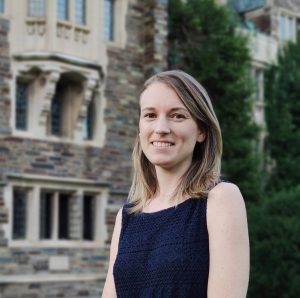
For this week’s interview we spoke with Dr. Julie Euvrard, a new Lecturer in Experimental Solid State Physics and the founder and PI of the Echoes Lab in Blackett.
As an introduction, what is your area of expertise within Physics?
My research focuses on new types of semiconductors that are alternatives to traditional silicon for various applications such as solar cells, LEDs, transistors… You might have heard of OLEDs, used in some phone and TV screens. These LEDs are made with organic semiconductors (‘O’ in OLED). Organic semiconductors are carbon and hydrogen-based molecules or polymers exhibiting semiconducting properties. They are interesting for applications requiring mechanical flexibility (you may have seen videos of foldable screens), optical transparency, and large area. Organic-based technologies also have the potential for lower fabrication costs, giving hope for cheaper solar energy solutions. It is this last application that motivates my research and helps me link my interests with societal needs.
Another class of materials I am working on are halide perovskites. Perovskites have a crystalline structure, like silicon, but are made of different atoms. The perovskites that are particularly trendy in research are composed of a mixture of atoms such as Pb and I, and organic molecules (for example CH3NH3). Hybrid organic-inorganic perovskites happen to be very good solar absorbers. Unfortunately, the lifetime of perovskite-based solar cells remains too low for commercialisation.
My interest lies in the physics of these emerging semiconductors and how it differs from traditional silicon. What you learn in semiconductor and device physics classes are key and necessary background, but it does not describe the behaviour of all materials. I use experimental tools to uncover this behaviour and relate it to what we know.
Which course will you be lecturing?
I will be involved in various things, starting with Y1 tutorials. I’m very excited to go over this physics again with a new perspective. I will give Y3 solid-state physics seminars, lead a new Y3 course called Interactive Physics, and give a few lectures on perovskites in an MRes programme.
Describe your path into physics, what kickstarted it?
Ever since I was young, I liked physics and loved reading science books. However, since no one in my family was a scientist, I could not really relate what science could be like outside a classroom. In France, an engineering degree is probably one of the most traditional paths in higher education and it’s the one I pursued. During one summer internship, I discovered research and loved it. I decided to continue with a PhD. Although the subject of my PhD was technology oriented, I was more interested in the physics involved. I later realised that my advisor gave me some freedom to bring my project slightly closer to my interests and I am grateful for that. After my PhD, I moved to the US where I did a first postdoc position at Duke University followed by one at Princeton University. There, I worked on less device-oriented and more fundamental projects. Yet, this field of research is not categorised as physics in the US. It can be in almost any engineering department but not in physics; it is too applied. I therefore never considered myself as a physicist until I joined Imperial. It is funny how categorisation can shape the way you and others think about you and your abilities. I am very happy to be in a physics department today, and I enjoy teaching physics. I feel like I ended up where I wanted to be from the beginning.
During your journey, what has your experience been being a woman in Physics?
I think that, when I was younger, being a woman wasn’t the biggest issue. The main issue was being what is called today ‘1st generation’. The biggest shock was when I left high school. A lot of students around me were coming from families with engineers, or other highly educated backgrounds. My parents did not go to high school; they did an apprenticeship and, by the time they were 18, would earn a living and started saving. I suddenly landed in a completely different world, and I did not feel I belonged. I wish we would speak more about 1st generation students, and I hope that these students feel more part of the community today.
Later I however started to realise that being a woman has its own problems. I heard incredible statements in the last few years. Some of the most extreme ones implied that electrical engineering (which is the closest description of my MSci degree) was not for women, or that it was weird that I had a higher degree than my husband. More subtle statements such as ‘Oh, this Scholarship/Fellowship/Lectureship/Award should be easier to get for you since you are a woman’ are by far more common and problematic I believe. It is actually hurtful. Knowing that some people might think I got my position because I am a woman is not very pleasant, and I feel like I must work twice as hard as men to gain credibility. There is still work to do to fight implicit bias.
Looking back, what advice would you have for your younger self?
I am tempted to tell my younger self to believe more in herself, ignore what other people think, and pursue her interests regardless of what the social norms suggest. But this is easy to say, not easy to do. A more practical advice would be to find support during your studies, both at school and outside. Don’t hesitate to reach out to people for help and to find mentors throughout your journey. Do not isolate yourself, and look for communities where you feel you belong. Talk to people! Realising that we are not alone with our struggles is probably one of the most efficient remedies.